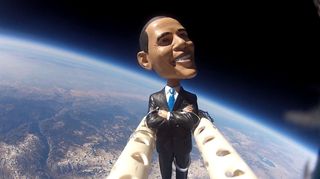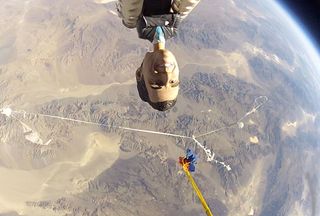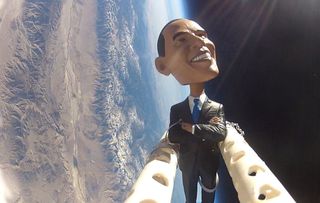
The U.S. presidential campaign was a political rollercoaster ride for Barack Obama and Mitt Romney, but it couldn't compare to the ride their bobblehead dolls took earlier this week.
On Monday (Nov. 5) — the day before President Obama defeated Romney to win a second term in the White House — a group of California schoolkids launched bobbleheads of the two candidates to the stratosphere aboard a high-altitude balloon.

"We estimate that the balloon reached 120,000 [feet]," Earth to Sky Calculus, a group of middle- and high-schoolers from Bishop, Calif., wrote on Facebook Wednesday. "It was a crystal clear, gorgeous fall day in the western United States!"
Onboard cameras documented the flight, recording the dolls' rise into the skies over east-central California and their dizzying descent after the balloon popped high above the Earth.
One video of the Obama and Romney dolls' flight, in fact, captures the transition from serenity to chaos after the balloon pops. The Obama doll's head is peacefully surveying the desert-mountain landscape one moment and bobbling furiously the next.
Earth to Sky Calculus eventually tracked down the fallen balloon and recovered its payload, group members said on Facebook.
Monday's launch wasn't the first balloon flight for some of the Bishop schoolkids. They also lofted a balloon in early September, as part of a project called The Golden iPod.
Get the Space.com Newsletter
Breaking space news, the latest updates on rocket launches, skywatching events and more!

The Golden iPod is a nod to the Golden Records aboard NASA's Voyager spacecraft, which launched in 1977 and are now nearing the edge of interstellar space. The records are meant to provide any aliens who may come across them an introduction to our species and our planet; they contain selections of some of our most celebrated music, greetings in 55 different human languages and much more.
The Golden iPod project aims to fill a 16-gigabyte mp3 player with more indicators and accomplishments of human culture, then launch it to Earth orbit in 2013.
"We plan to fill our iPod with the best humanity has to offer — old and new," team member Anna Herbst said in a statement. "Then, if all goes as planned, we're going to send it to space."
Before it leaves the planet, the Golden iPod will visit the stratosphere during a series of high-altitude balloon flights, team members said. The first flight took place Sept. 5.
Follow SPACE.com senior writer Mike Wall on Twitter @michaeldwall or SPACE.com @Spacedotcom. We're also onFacebook and Google+.
Join our Space Forums to keep talking space on the latest missions, night sky and more! And if you have a news tip, correction or comment, let us know at: community@space.com.

Michael Wall is a Senior Space Writer with Space.com and joined the team in 2010. He primarily covers exoplanets, spaceflight and military space, but has been known to dabble in the space art beat. His book about the search for alien life, "Out There," was published on Nov. 13, 2018. Before becoming a science writer, Michael worked as a herpetologist and wildlife biologist. He has a Ph.D. in evolutionary biology from the University of Sydney, Australia, a bachelor's degree from the University of Arizona, and a graduate certificate in science writing from the University of California, Santa Cruz. To find out what his latest project is, you can follow Michael on Twitter.
